Victorian Indian Mutiny medal Pte Stanley 8th Rgt & Royal Bengal Fuslr fr Dublin
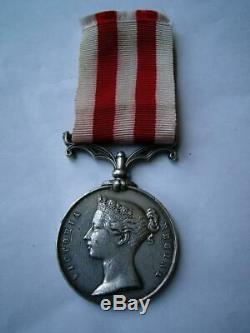
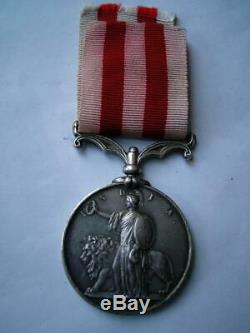
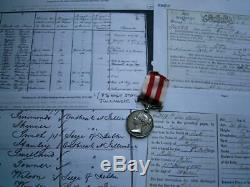


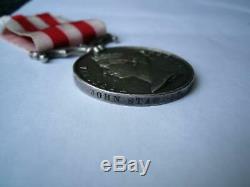
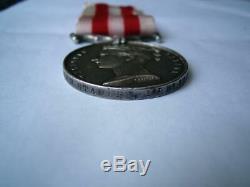
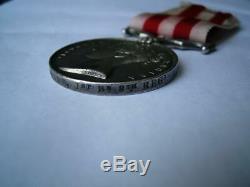
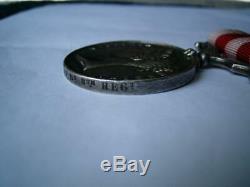

Indian Mutiny 1857-58, awarded to Private John Stanley 8th Regiment (Kings Liverpool), official impressed capital lettering, almost very fine condition, some light contact marks and minimal edge rim bruises , few light marks and scratches if any, design still sharp, good patina, detail very good, comes with copy medal roll showing entitlement to medal and copy attestation with service history. He attested for the 8th Regiment no 2830 Private 1847 aged 20 years old, Labourer, born town of Manawan, parish of Lusk, Dublin, Ireland. He served in India during Mutiny 1857-58 in the 8th regiment, medal roll mentions present during "OUTBREAK AT JULLUNDER" , regiment was stationed at Jullunder 1857 (Jalandhar, Punjab, Northern India).
He Volunteered/transferred 104th Regiment of Fusiliers in 1865 (Royal Bengal Fusiliers, later Royal Munster Fusiliers), no 3350 Private, discharged 1868 after 21 years service aged 41, also earned long service good conduct medal, see pictures for condition. Victorian Indian Mutiny medal Pte Stanley 8th Rgt & Royal Bengal Fuslr fr Dublin. Indian Mutiny medal Private Stanley 8th Regiment & Royal Bengal Fusiliers. Indian Mutiny medal 1857-58, 2830 Private John Stanley 8th Regiment, from Manawan, Dublin, Ireland Indian Mutiny 1857-58, awarded to Private John Stanley 8th Regiment (Kings Liverpool), official impressed capital lettering, almost very fine condition, some light contact marks and minimal edge rim bruises , few light marks and scratches if any, design still sharp, good patina, detail very good, comes with copy medal roll showing entitlement to medal and copy attestation with service history. He attested for the 8th Regiment no 2830 Private in 1847 aged 20 years old, Labourer, born town of Manawan, parish of Lusk, Dublin, Ireland.
He served in India during Mutiny 1857-58 in the 8th regiment. The medal roll mentions present during "OUTBREAK AT JULLUNDER" , regiment was stationed at Jullunder 1857 (Jalandhar, Punjab, Northern India). He Volunteered/transferred to 104th Regiment of Fusiliers in 1865, (Royal Bengal Fusiliers, later Royal Munster Fusiliers) no 3350 Private, discharged 1868 after 21 years service aged 41, also earned long service good conduct medal, see pictures for condition. In 1846, the regiment began a 14-year posting to India, stationed initially in the Bombay Presidency.At the beginning of the rebellion in May 1857, the 8th Foot occupied a cantonment of Jullundur, together with three Indian regiments and two troops of horse artillery. The complex array of motives and causes that culminated in the mutiny of much of the Bengal Army would be catalysed in 1857 by rumours that beef and pork fat was being used to grease paper rifle cartridges. Confined first to a number of Bengal regiments, the mutiny eventually manifested in some areas as a more diverse, albeit disparate, rebellion against British rule. Soon after reports were received of the first mutiny at Meerut on 10 May, the 8th's commanding officer, Lieutenant-Colonel Richard Hartley, had two companies secure the fort of Phillaur, near Jullundur, due to the significance of its magazine stores and reports that the third Bengal Native Infantry intended to seize it.
Sepoys with British Officer 1857. After a period of seven weeks in Jullundur, the regiment became attached to an army preparing to besiege Delhi. Because of a shortage of troops, due primarily to cholera and other diseases, several weeks elapsed before the British had attained a strength sufficient to commence operations.
In July 1857, two companies supported a position that had been under attack for seven hours. The King's participated in the capture of Ludlow Castle, in the vicinity of Kashmiri Gate in the northern walls of Delhi. Grouped into the 2nd Column with the 2nd Bengal Fusiliers and 4th Sikhs, the. 8th King's attacked Delhi early on 14 September with the intent of capturing the Water Bastion and Kashmiri Gate. Once the city had been secured by the British, the 8th's Lieutenant-Colonel Edward Greathed vacated his position and became commander of a column dispatched to Cawnpore.
The regiment, commanded by Major Hinde, had been seriously depleted and the combined total of it and the 75th Foot numbered just 450. The regiment also took part in the second Relief of Lucknow in November, seeing much action until withdrawing, after the evacuation of civilians, on the 22nd.
In an environment of systematic reprisal by the British, Captain Octavius Anson, of the 9th Lancers, recalled observing acts of punitive violence against Indian civilians, including the alleged killing of incapacitated villagers by soldiers of the 8th Foot. Where it remained for a decade.
The regiment's 2nd Battalion, which had been reconstituted in 1857, was itself posted to Malta (in 1863) and India (in 1877), and met up with the 1st King's on the island and at Mundra, in the Bombay Presidency. The item "Victorian Indian Mutiny medal Pte Stanley 8th Rgt & Royal Bengal Fuslr fr Dublin" is in sale since Thursday, July 25, 2019. This item is in the category "Collectables\Militaria\19th Century (1800-1899)\Medals/ Ribbons".
The seller is "theonlineauctionsale" and is located in England. This item can be shipped worldwide.
- Country/Region of Manufacture: United Kingdom
- Country/ Organization: Great Britain
- Issued/ Not-Issued: Issued
- Type: Medals & Ribbons
- Conflict: Indian Mutiny 1857-59
- Service: Army
- Era: 1816-1913

